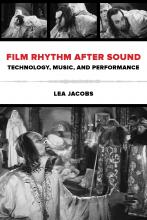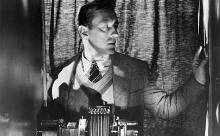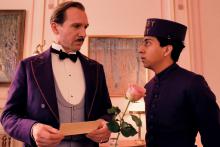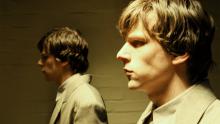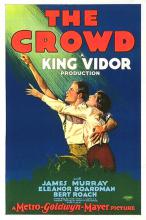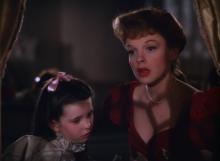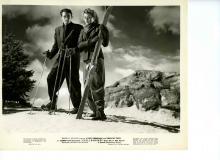Jim Healy is Director of Programming of the UW Cinematheque and the Wisconsin Film Festival.
As a Cinematheque Curator and as a Wisconsin Film Festival Programmer, I usually have the great luxury of not having to see every “new release”, unlike most film critics. This means that on an annual basis, I will usually see more movies from cinema’s past than its present, but I don’t really believe in “old movies”; there are movies I’ve seen and movies I haven’t seen. Because I’m allowed to follow my interests and instincts when selecting the movies that I watch, the average quality of each film I see is pretty high and I saw a lot of great and very good things last year. Of the nearly 550 feature films that were all new to me in 2014, these 20, presented here in alphabetical order, were my very favorites (I've written in greater detail on some of the more vintage titles here at Brian Saur's Rupert Pupkin Speaks blog):
BOYHOOD (2014, Richard Linklater)
COUNTER-ATTACK (1945, Zoltan Korda)
THE CROWD (1928, King Vidor)
FIVE CAME BACK (1939, John Farrow)
THE GRAND BUDAPEST HOTEL (2014, Wes Anderson)
A HIGH WIND IN JAMIACA (1965, Alexander Mackendrick)
THE HOMESMAN (2014, Tommy Lee Jones)
THE IMMIGRANT (2013, James Gray)
JUDEX (1963, Georges Franju)
JUKE GIRL (1942, Curtis Bernhardt)
THE KEEPING ROOM (2014, Daniel Barber)
LIFE ITSELF (2014, Steve James)
LISTEN UP PHILIP (2014, Alex Ross Perry)
MADEMOISELLE FIFI (1944, Robert Wise)
MR. TURNER (2014, Mike Leigh)
NORA PRENTISS (1947, Vincent Sherman)
THREE SECRETS (1950, Robert Wise)
IL SORPASSO (1962, Dino Risi)
THE TALE OF PRINCESS KAGUYA (2013, Isao Takahata)
I also enjoyed these movies; some more than others, of course, but I offer the list in alphabetical order instead of any sort of critical ranking. Consider it a highlighted sampling of my 2014 viewing adventure:
ACTRESS (2014, Robert Greene)
AMERICAN SNIPER (2014, Clint Eastwood)
APPROACHING THE ELEPHANT (2014, Amanda Rose Wilder)
THE ARNELO AFFAIR (1947, Arch Oboler)
THE BABADOOK (2014, Jennifer Kent)
BAD GRANDPA (2013, Jeff Tremaine)
BEATRICE CENCI (1956, Riccardo Freda)
BEWITCHED (1945, Arch Oboler)
BIG EYES (2014, Tim Burton)
BIG HERO 6 (2014, Don Hall, Chris Williams)
THE BIG LAND (1957, Gordon Douglas)
BLACK HAND (1949, Richard Thorpe)
THE BOXTROLLS (2014, Graham Annable & Anthony Stacchi)
THE BOYS IN THE BAND (1970, William Friedkin)
THE BRIGHTON STRANGLER (1945, Max Nosseck)
CALVARY (2014, John Michael McDonagh)
CHAMPION (1949, Mark Robson)
CLAUDELLE INGLISH (1961, Gordon Douglas)
THE CRAZY-QUILT (1966, John Korty)
CRIME WAVE (1985, John Paizs)
THE CROSS OF LORRAINE (1943, Tay Garnett)
DAWN OF THE PLANET OF THE APES (2014, Matt Reeves)
DRAFT DAY (2014, Ivan Reitman)
DUST BE MY DESTINY (1939, Lewis Seiler)
THE DUKE OF BURGUNDY (2014, Peter Strickland)
EDGE OF TOMORROW (2013, Doug Liman)
ELECTRIC BOOGALOO: THE WILD, UNTOLD STORY OF CANNON FILMS (2014, Mark Hartley)
ENOUGH SAID (2013, Nicole Holofcener)
THE EQUALIZER (2014, Antoine Fuqua)
THE FAREWELL PARTY (2014, Sharon Mayman & Tal Granit)
FELIX AND MEIRA (2014, Maxime Giroux)
THE FIEND WHO WALKED THE WEST (1958, Gordon Douglas)
FINDING VIVIAN MAIER (2013, John Maloof and Charlie Siskel)
FLAMINGO ROAD (1949, Michael Curtiz)
FOUR HOURS TO KILL (1935, Mitchell Leisen)
FURY (2014, David Ayer)
THE GO GO BOYS (2014, Hilla Medalia)
THE GREAT MAN (2014, Sarah Leonor)
GUARDIANS OF THE GALAXY (2014, James Gunn)
THE GUEST (2014, Adam Wingard)
THE HANGMAN (1959, Michael Curtiz)
HAPPY CHRISTMAS (2014, Joe Swanberg)
THE HARD WAY (1942, Vincent Sherman)
HERCULES (2014, Brett Ratner)
THE HITLER GANG (1944, John Farrow)
HOTEL (1967, Richard Quine)
HOW TO TRAIN YOUR DRAGON 2 (2014, Chris De Blois)
HUMORESQUE (1947, Jean Negulesco)
THE HUNGER GAMES: MOCKINGJAY, PART 1 (2014, Francis Lawrence)
INFINITELY POLAR BEAR (2014, Maya Forbes)
INTERSTELLAR (2014, Christopher Nolan)
INTO THE WOODS (2014, Rob Marshall)
I SAW WHAT YOU DID (1965, William Castle)
IT FOLLOWS (2014, David Robert Mitchell)
IT’S A SMALL WORLD (1950, William Castle)
JACQUOT DE NANTES (1992, Agnes Varda)
JOHN WICK (2014, Chad Stahelski)
JOHNNY BELINDA (1948, Jean Negulesco)
JOHNNY COME LATELY (1943, William K. Howard)
THE KINGDOM OF DREAMS AND MADNESS (2014, Mami Sunada)
KUMIKO: THE TREASURE HUNTER (2014, David Zellner)
LADIES OF LEISURE (1930, Frank Capra)
LAND HO! (2014, Martha Stephens & Aaron Katz)
LIFE OF CRIME (2013, Daniel Schechter)
LIVING IN A BIG WAY (1947, Gregory LaCava)
LOCKE (2014, Steven Knight)
LOUIE BLUIE (1985, Terry Zwigoff)
LOVE IS STRANGE (2014, Ira Sachs)
LUCY (2014, Luc Besson)
MACABRE (1958, William Castle)
MACISTE ALL’INFERNO (1962, Riccardo Freda)
THE MAGGIE (1954, Alexander Mackendrick)
THE MAGIC FACE (1951, Frank Tuttle)
MALEFICENT (2014, Robert Stromberg)
THE MAN IN THE WHITE SUIT (1952, Alexander Mackendrick)
MANDALAY (1934, Michael Curtiz)
MANGE TES MORTS (2014, Jean-Charles Hue)
MAN WITHOUT A STAR (1955, King Vidor)
MARGIN FOR ERROR (1943, Otto Preminger)
MASSACRE (1934, Alan Crosland)
THE MERRY WIDOW (1925, Erich von Stroheim)
METALLICA: THROUGH THE NEVER (2013, Nimrod Antal)
MILLION DOLLAR ARM (2014, Craig Gillespie)
I MISERABILI (1948, Riccardo Freda)
LES MISERABLES (1935, Richard Boleslawski)
THE MOONSHINE WAR (1970, Richard Quine)
MUPPETS MOST WANTED (2014, James Bobin)
THE NAKED DAWN (1955, Edgar G. Ulmer)
NIGHTHAWKS (1978, Ron Peck, Paul Hallam)
NON-STOP (2014, Jaume Collet-Serra)
OKLAHOMA! (1955, Fred Zinnemann)
THE ONLY SON (1936, Yasujiro Ozu)
PARACHUTE JUMPER (1933, Alfred E. Green)
PARRISH (1961, Delmer Daves)
PASOLINI (2014, Abel Ferrara)
PHILOMENA (2013, Stephen Frears)
LA PIU BELLA SERRATA DELLA MIA VITA (1972, Ettore Scola)
RAPTURE (1965, John Guillermin)
RAIN OR SHINE (1930, Frank Capra)
THE REACH (2014, Jean-Baptiste Leonetti)
THE RETURN OF THE SECAUCUS SEVEN (1980, John Sayles)
THE REVOLUTIONARY (1970, Paul Williams)
RIDE A WILD PONY (1976, Don Chaffey)
THE RIVER WILD (1994, Curtis Hanson)
RUN FOR THE SUN (1956, Roy Boulting)
A RUN FOR YOUR MONEY (1949, Charles Frend)
SABBATICAL (2014, Brandon Colvin)
SABOTAGE (1936, Alfred Hitchcock)
SABOTAGE (2014, David Ayer)
SANTIAGO (1956, Gordon Douglas)
LA SAPIENZA (2014, Eugene Green)
SEED OF CHUCKY (2004, Don Mancini)
SHOOTER & WHITLEY (2014, Laura Stewart)
SHOOT FIRST…DIE LATER (1975, Fernando Di Leo)
SIDDHARTH (2013, Richie Mehta)
SILK STOCKINGS (1957, Rouben Mamoulian)
SOMETHING, ANYTHING (2014, Paul Harrill)
SPECULATION NATION (2014, Bill Brown & Sabine Gruffat)
STAND CLEAR OF THE CLOSING DOORS (2013, Sam Fleischner)
THE STRANGE DEATH OF ADOLPH HITLER (1943, James Hogan)
STRANGER ON HORSEBACK (1955, Jacques Tourneur)
STRAY DOG (2014, Debra Granik)
SUSAN SLADE (1961, Delmer Daves)
TEODORA (1953, Riccardo Freda)
THEY MADE ME A CRIMINAL (1939, Busby Berkeley)
THIRTEEN (1998, David D. Williams)
TILLIE AND GUS (1933, Francis Martin)
TIM’S VERMEER (2013, Teller)
THE TITFIELD THUNDERBOLT (1952, Charles Crichton)
TOMBOY (2011, Celine Sciamma)
22 JUMP STREET (2014, Phil Lord, Chris Miller)
2 DAYS, 1 NIGHT (2014, Jean-Pierre & Luc Dardenne)
UNBROKEN (2014, Angelina Jolie)
UNDER THE SKIN (2013, Jonathan Glazer)
UNION DEPOT (1932, Alfred E. Green)
A VERY HAROLD AND KUMAR 3D CHRISTMAS (2011, Todd Strauss-Schulson)
THE WALKING DEAD (1936, Michael Curtiz)
WALK SOFTLY, STRANGER (1950, Robert Stevenson)
WELCOME TO HARD TIMES (1967, Burt Kennedy)
WHEN YOU WORE A TULIP AND I WORE A BIG RED ROSE (1983, Steven Schaller)
WHERE EAST IS EAST (1929, Tod Browning)
WHIPLASH (2014, Damien Chazelle)
WHY BE GOOD? (1929, William Seiter)
WILD (2014, Jean-Marc Vallee)
X-MEN: DAYS OF FUTURE PAST (2014, Bryan Singer)
YOUNG AT HEART (1954, Gordon Douglas)

